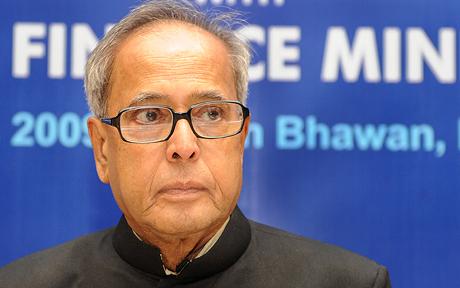The central bank’s anti-inflationary stance has hurt the country’s economic growth, the government said on Tuesday, but it exuded confidence that the current deceleration was a temporary blip.
The economy should soon clock a double-digit growth, Finance Minister Pranab Mukherjee said here.
The comments come less than a month ahead of the Reserve Bank of India’s monetary review and the Budget for 2012-13.
“Reinventing the growth track is something that we must not lose sight of,” Mukherjee cautioned at 91st annual session of Assocham. “India has to target a double-digit growth in the not-too-distant future. We have shown that we can grow fast, but we must learn to sustain it over extended period of time.”
Advance estimates released by the Central Statistical Organisation have pegged the gross domestic product growth in 2011-12 at 6.9 per cent — lowest after the global crisis of 2008.
As the GDP growth during the first half of the current financial year stands at 7.3 per cent, it will be even lower in the second half. In fact, India never recorded a double-digit growth in a year except for 1988-89, though old-time series makes economic expansion of those incomparable to that of today.
Even before the crisis of 2008-09, India’s economy grew on an average at nine per cent growth rate for the previous three consecutive years.
But, it did not register a 10 per cent growth rate even for a single year.
The finance minister said a tight monetary policy had impacted investment and consumption by increasing the cost of credit. But lately, there has been a certain moderation to inflation, which remained consistently high in the last two years. Inflation last month stood lower at 6.6 per cent, against 7.5 per cent a month ago. Food inflation fell to -0.5 per cent in January against 0.7 per cent a month ago and about 17 per cent a year ago. After increasing policy rates by 13 times in a row, the RBI cut cash reserve ratio requirements in its last credit policy review, but kept policy rates intact.
“Nevertheless, we have been able to keep the adverse impact of global slowdown and uncertainty on our economy to the minimum,” Mukherjee said. “I expect this slowdown to be temporary. The economy would soon revert to the high growth trajectory.”
With the Centre’s finances in the doldrums, analysts say that it will be a tough call for the Finance Ministry to balance the need for economic growth and reduce the fiscal deficit, which is expected to rise by one percentage point beyond the budget estimates of 4.6 per cent of the GDP for 2011-12.
Mukherjee said growth, for it to be sustainable in the long term, has to be broad-based across sectors, regions and among the population segments of our society. He stressed on improving factor productivity through technological innovations and process reengineering, and said the country needed to focus on three key areas — education and knowledge creation, creating and strengthening of a competitive environment to support private enterprise, and encourage a greater focus on research and design activities in enterprises and in institutions of higher learning.
The minister said the government has now put in place the New Manufacturing Policy to give a big push to the manufacturing sector with the objective of increasing its share in the GDP to 25 per cent and create 100 million jobs in the next ten years. “We are putting in place an enabling framework for ease of doing business, compliance based on self-regulation, ensuring availability of skills, technology and finance within a supportive environment,” he said.
Source: Business Standard
 Asia Finance News Asia finance news, banking, market analysis, business, Forex, trade, Cryptocurrency as it is happening in Asia. Trusted gateway for Asian financial news.
Asia Finance News Asia finance news, banking, market analysis, business, Forex, trade, Cryptocurrency as it is happening in Asia. Trusted gateway for Asian financial news.





